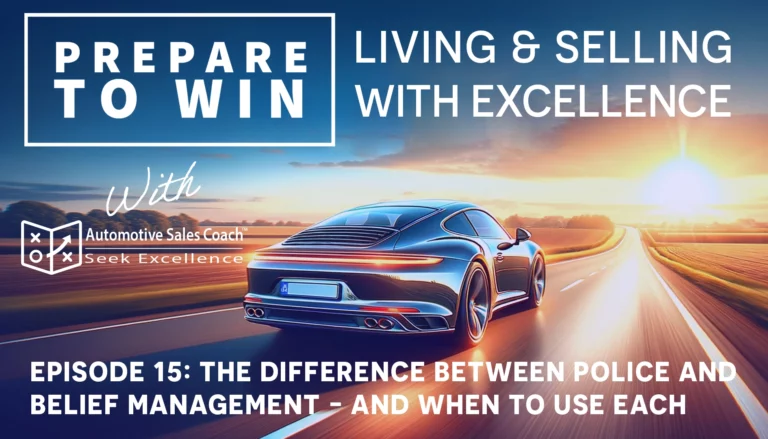In today’s episode of “Prepare to Win,” we delve into the transformative power of self-examination. In this episode, we explore the critical role of introspection in achieving excellence in both personal and professional realms. Self-examination is not just about assessing where we stand but is a strategic tool for personal and professional development.
Discover the essence of being better today than yesterday (BTTY), and how this mindset fosters continuous improvement, growth, and success. Understand the impact of personal responsibility and accountability in propelling one’s journey towards excellence.
With actionable insights and strategies, this episode is a must-listen for sales professionals aiming to elevate their performance and for anyone seeking to imbue their daily lives with purpose, growth, and fulfillment. Join us as we discuss how facilitated reflection, with the aid of coaching, can offer sales teams a roadmap to identifying strengths, uncovering areas for improvement, and implementing effective strategies for customer interactions and sales success.
Learn why embracing areas of excellence and opportunities with an open heart is the key to unlocking your potential. This episode is not about offering mere inspiration but equipping you with the tools to transform inspiration into actionable change.
Whether you’re a general manager, sales manager, or a sales consultant within the automotive industry, Automotive Sales Coach helps you Prepare to Win with timeless principles and practical advice to help you navigate your journey towards excellence. Remember, excellence is not a destination but a continuous journey.
Let’s embark on this journey together, with the “Prepare to Win” podcast as your guide to achieving unparalleled success in sales and life.
Grace Lupoi: 0:00
Welcome to Prepare to Win. I’m Grace and this is David Lowe, the automotive sales coach, and today we’re gonna walk through the power of self-examination.
David Lowe: 0:07
You’re gonna wanna stay tuned.
Hey, I’m so glad that you’re with us. We’re gonna talk about a power principle, right? Everything we do in this podcast, every episode, is dedicated to living and working with excellence. Right, leveling up whatever you’re doing, becoming better at right. We believe a life in pursuit of excellence is one. It’s a healthy pride, right. Joy, peace and satisfaction. Today, we’re gonna talk about self-examination and really relate it in a practical sense to the coaching we do at automotive sales coach, right? So what is self-examination? I’m gonna take you back some thousands of years, like I always do. The apostle Paul said each person should examine themself. And then we know that one of the famous quote nobody knows exactly who said it first, because it’s been misquoted by somebody said that an unexamined life isn’t worth living, right? In other words, we want to constantly be reviewing ourselves. Self-examination. So view ourselves on what Today did I live according to my values? Now we know that Ben Franklin did this 200 years ago. He had his 13 virtues. This is what I’m gonna do today. Every day I woke up. What good am I gonna do? What am I gonna learn today? And he was focused on one virtue at a time, right? And then at the end of the day he would self-examine how did I do on it, right? The joke is, when he was on the humility, I was really humbled. Today I did a great job, right, anyway. So there’s this thing of self-examination. It’s not enough to set the course right. You have to make sure you’re on track to hit your destination. So self-examination is like a timeout. How did I? I like the daily one, as I’m reflecting on my goals for tomorrow. My morning day planning now is at night, the night before, because I’m getting up really early to go to the gym and stuff. So I like to make sure that the night before I set out what I’m gonna do, review my calendar, review the tasks, the projects, whatever. And that’s a great time for me to say how did I do today right? Did I live according to my values? Did I achieve my goals? Was my attitude and actions good? Where was I weak? Where did I suck in? Where did I really excel right? That’s the only that’s like a self-aligning thing. It’s like looking at your car on the road are you you know where you’re supposed to be? I think what if you don’t align? So self-examination is supposed to keep you on the road you wanna be at right. So we know that for salesmen, we talk about areas of opportunity what are you doing really well? And areas of excuse me, areas of excellence what are you doing really well? And areas of opportunity what could you be doing better than you’re doing? So, area of excellence. Of course I’m doing this really well. I gotta keep doing that. Areas of opportunity holy crap, I wish I hadn’t done that. I need to do better and that’s really cool because that means you can excel. So, as you do this with salespeople in a real practical way right, I think you call it the deal self-examination. So let’s walk through kind of what you do with that and how you interact with and how salespeople respond to that.
Grace Lupoi: 3:42
So I mean also it really starts off with our BTTY better today than yesterday right. And how can we be better today if I don’t know how I did yesterday?
David Lowe: 3:50
That’s a good point, but it’s just what you’re talking about. You gotta have a benchmark right. Exactly, a measuring stick, yeah.
Grace Lupoi: 3:55
Right. So I hold these meetings with these new sales consultants and really it’s just like that, as we’re developing these habits. What are the things I’m doing really well and what are the things I need to improve on Excellence opportunity. It’s been really cool and I’ve really seen a pattern of the people who wanna take that personal responsibility and then we go through their deal and say, hey, I did this and I did this and I did this and I did this. They’re having more success and they’re still finding ways. Well, how about this? And they ask some questions and how can I improve maybe the way I told the store or how can I improve the way I led my customers? I still have phone calls all the time.
David Lowe: 4:28
So let’s go back, let’s go back to that. So you’re actually walking them through. You’re making them go back to start, that’s right, and walk through the last deal they did, or a deal right, one, two right. So it’s like they’re re-driving the route Right. And now they’re re-driving the route as a spectator, kind of looking at themselves how did I do? And you’re going right down the sales process and what I think I heard you say is that at each step they’re evaluating, based on the training or the best practice, the success model they’ve learned. Right? Is that right?
Grace Lupoi: 5:06
That’s right, okay, so keep going, exactly, yeah. So yeah, like you said, we go through how a deal that they either sold or one that wasn’t sold. I’ll let them pick a deal that you would like to talk through. Yeah, refresh yourself beforehand and I have them tell me. So, tell me about this deal. And it just starts off with a conversation Well, I had so-and-so come in. They called in, made an appointment, they walked me through. I went through everything. How did I meet them? I walked them through, what did you learn at each step? How did the step go? And I allow them to tell me and we set the stage for this is in an area to talk about what you’re doing well and how can I continue to get better.
David Lowe: 5:40
Yeah.
Grace Lupoi: 5:40
Right, I know that the more I do and the better I am, the more I make. So who wouldn’t want to talk through that formula?
David Lowe: 5:47
right? Yeah, so that self-examination, you’re just facilitating it done Right, You’re not examining them. I’m telling you what you did well, I’m telling you what you did wrong. You’re saying let me facilitate, Let me walk you through this as you examine your steps. That’s the power, isn’t it? That is our, so somebody else can tell you. But when you discover holy cow, it’s like a the light bulb goes off, you’re like, oh, I can’t believe I did that. I can’t believe I said that, and it’s kind of cool that you’re there for coaching at that moment to remind them of the success model, right? What does a good job look like?
Grace Lupoi: 6:25
Exactly.
David Lowe: 6:26
Yeah.
Grace Lupoi: 6:26
And as we’re walking through, the cool thing is, like you said, I asked, hey, how did the trial close go? And I say, well, I mean it went okay. And then that opens the door for some additional conversation. And this is an area that maybe they’re not quite hitting their capacity on or maybe they’re not doing it as the full potential that they have. And so, walking through that and allowing to have that coaching moment, they kind of get to be refreshed on here’s why I do this step, here’s why it serves me and they get to kind of lead themselves through that discovery.
David Lowe: 6:54
So the self-examination is not simply for actions, right. It’s also for uncovering areas of opportunity to have in training. What things have I mastered? What things am I still struggling with? Right, not just what am I doing and not doing, not just what am I saying and not saying, but as I’m going through this, I might find patterns of areas. The reason I’m not doing or saying what I feel like I should have is because maybe the depth of my knowledge and understanding isn’t there yet. That’s right. I got to go back to training. That’s exactly right so having you there to coach. I think everybody needs a coach, Right? So we talked about. Yeah, right, we talked about. I think we all do. I think it was a few episodes back about accountability. Nobody’s their best. I’m sure we’re going to talk about again such a powerful principle, but a coach is an accountability partner. That’s really all it is. A coach Help you. If you don’t want to improve, the coach can’t do anything.
Grace Lupoi: 7:54
Right.
David Lowe: 7:54
So the coach doesn’t improve you. The coach is a facilitator for your improvement, Right? That’s why coaches and professional sports are so powerful. Every player wants to be the best, and so all that coach is doing is help them. See, there’s your excellence, there’s your opportunity. Let’s go after it, right. Right, so it’s fantastic. So how did that go ahead? I’m sorry.
Grace Lupoi: 8:14
Well, it just leads right back to those areas of personal responsibility. Yeah Right, I’m there, like you said, to facilitate that evaluation. How am I doing? And then it’s up to them whether they decide. You know what I’m going to continue to strive and work on my area of opportunity or I’m just going to ignore it and kind of focus on what I can do.
David Lowe: 8:32
well, Isn’t that amazing? Yeah, so we do have two types of people. We talked about this in an episode not too long ago Yep, leaders and followers, right. And a leader takes responsibility. A follower is going to be like yeah, I did a deal examination and not do much with it Right. A leader is going to accept responsibility for their own improvement. And, when you look around, people who succeed and excel, make a difference or benefit to others Right. Typically make these decisions to get better in these areas. They don’t need somebody, they need a coach to remind them, but they’re the ones who are going to have to actively decide every day what they have to do to become better. So that’s very good. Let me ask you this how are most students? How do they respond to the self-examination? Positive or negative?
Grace Lupoi: 9:23
Very positive, very positive, very positive, right, because once again, we are the ones that are facilitating it and it’s really a conversation. How are things going?
David Lowe: 9:30
Yeah.
Grace Lupoi: 9:31
And, like we said, those that choose to take leadership and take that person’s responsibility. They’ve got that clear game plan of what am I going to do next, right, and even if they’re not quite ready for that step or they don’t think they’re ready to take that step and just have the conversation, it still tunes them to be intentional on what they’re doing the rest of that day, week, month, et cetera.
David Lowe: 9:50
That’s cool. So I’ve said for a long time we go into dealerships and the businesses and what do your employees want Right? Do they know what a good job looks like? They want to know that Right. They want to be treated with respect, valued, appreciate. We know all these things Right. One thing that many leaders don’t realize is their team members want accountability. It seems like everybody’s trying to get away from accountability, and that’s true because I think a lot of the other parameters haven’t been decided. What’s a good job look like? But what a good job looks like becomes more and more clear. People want to be told how am I doing Right? What am I crushing? That’s right, and what do I need to do better? I feel like it’s one of the missing ingredients in management and leadership. Is this positive accountability, our pillar number three in leadership. So it kind of fits together, doesn’t it? Personal self-examination, leadership, set clear and high expectations, hold them positively accountable and, of course, love unconditionally right. Pillar four Give that feedback, Coach correct and graduate Feedback to help inspire. So today we’re talking about a principle. I just don’t think anybody’s ever really become great without this principle, which is the principle of self-examination. How am I doing? How am I living the life that I want? Am I living the life according to the values that I’ve set, the things that are important to me? Are they coming out? Am I becoming the person I wanna become? Are my actions and attitudes the ones that I want to relive and to write over and over? And so we wanna remind you that if you want to be a benefit to others, if you wanna be a success, we call success living with excellence. It’s hard to define success in material things, but you can define it in peace of mind, joy, peace and satisfaction. You can define it in healthy pride, and we know that comes from pursuit of our best self. Self-examination is a tool and a principle that will help you live that way.
Grace Lupoi: 12:06
And, like we said, that humility and taking that humility, it’s power. There’s power in saying I’m really great at what I do and I can get better, which? Is gonna lead you to living with that joy, peace and satisfaction. Even just this morning I had a phone call from a sales consultant said hey, I’m coaching this newer sales consultant on leasing. How does this go again? Did I do it right? And even he is taking that hey, how can I make it better, not only for himself but also for the sales consultant he’s teaching?
David Lowe: 12:32
Isn’t that fantastic.
Grace Lupoi: 12:33
There’s power in asking for feedback. And how am I doing? People wanna know, like you said, they want to know what does a great job look like. I’m not quite up to par. How can I get there?
David Lowe: 12:41
That’s right, and self-examination is a tool that serves us. So I think we thank you for joining us for this episode, and thanks for following this podcast, joining in whenever you can and liking this podcast, sharing it with friends, and I think what you’re probably gonna see if you watch or listen to more episodes is how interdependent these principles become, how one feeds the other. Is that right? And so, in pursuit of our best self, we might as well pursue the principles that drive excellence into our life. They’re timeless principles, they’re free to everyone, and everybody who seeks them will find them. Seek is an active word, though, and one of the things that we’re doing with this podcast, and every episode is dedicated to helping seekers find the information they need to level up, to become better today than yesterday. So thanks for joining us. I’m David Lowe, the Automotive Sales Coach with Grace Lupoi. We thank you so much, and good selling.






